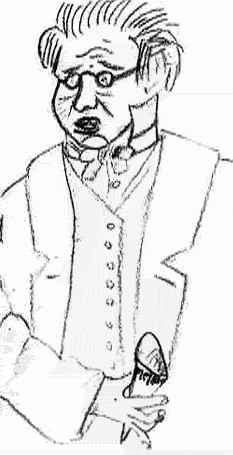

 Part Two
School Days
Part Two
School Days

Part Two School Days

[That I had] much romping in the open air, [a] long walk to school, and the companionship of unusually robust boys, caused my mother grievous suffering; but this did not prevent me from becoming the opposite of a stay-at-home. And although at that time I had scarcely any thought about my future career, I had decidedly no sympathy for the course my father's career had taken. I believe that even then my talent for making speeches was being developed, in the more or less violent arguments with my schoolfellows. I had become a little ringleader, and at school learned easily and well, but was otherwise rather difficult to handle.
In April of 1895 the upwardly mobile Hitler family moves to the hamlet of Hafeld, Austria, some thirty miles southwest of Linz, the provincial capital.1 Consisting of a dozen houses set on a high ridge, surrounded and half-hidden by orchards, Hafeld is a small village with a population of around one hundred. With the intention of working the land during his impending retirement, Alois, with nearly forty years in the customs service, purchases a beautiful nine-acre farm within sight of the mountains of the Salzkammergut.2
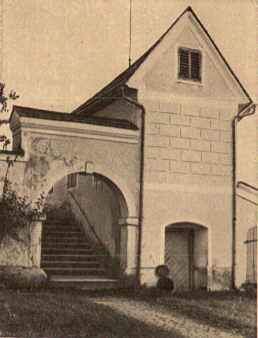
Though retiring early to devote his remaining years to the (what might be presumed) idyllic existence of a peasant farmer, Alois is nevertheless firmly convinced that his sons, especially the under-achieving eldest, Alois II, could do no better in life than to follow in their father's footsteps by entering the civil service. After devoting the major part of his adult life to furthering his career, the previously much absent father now has the time to become involved in the lives of his children.
Quiet and unassuming, with a temperament similar to her mother's, Paula will remain Adolf's closest family link throughout his life. Adolf and Paula are the only offspring of both Klara and Alois to survive childhood, and neither will have children. She will die in obscurity in 1960.Paula Hitler:
I liked my brother (Adolf) best of all my brothers and sisters in spite of the difference in age. .... Since I was so much younger than my brother he never considered me a playmate. He played a leading role among his early companions. His favorite game was cops and robbers, and that sort of thing. He had a lot of companions. I could not say what took place in their games, as I was never present. Adolf as a child always came home too late. He got a spanking every night for not coming home on time. ....
When my brother became more and more active (in politics) and the name "Hitler" was known in Vienna, I had difficulties to such an extent, that I was at last dismissed from my position. At that time I changed my name to "Wolf". I went to Munich and described my difficult position of life to my brother. With full understanding he assured me that he would provide for me in future. He did so until his death and at first transferred the sum of 250 Mk, (and) later on since 1938 the sum of 500 Mk to me. Moreover I got a present of 3000 Mk every Christmas. ....
The personal fate of my brother affected me very much. He was still my brother, no matter what happened. His end brought unspeakable sorrow to me, as his sister.
32 years later, in a 1948 interview, Alois II will still feel much resentment:
He (Adolf) was imperious and quick to anger from childhood onward and would not listen to anyone. My stepmother always took his part. He would get the craziest notions and get away with it. If he didn't get his way he got very angry. .... He had no friends, took to no one, and could be very heartless. He could fly into a rage over any triviality.8
Alois II will go on to lead an eventful life, including being jailed at least three times, twice for theft, once for bigamy. Hitler biographer Robert Payne, in The Life and Death of Adolf Hitler, says of Alois II:Although Alois Jr. was the black sheep , he was probably the happiest member of the family. He had an earthy robust character, charmed women, and lived by his wits. He was always inventing schemes for getting rich quickly, and most of them came to grief. Neither prison nor poverty soured him. He was unfailingly good-humored and polite, even when he was about to be sentenced by a judge or when he was abandoning his latest wife. He was one of those who enjoy life to the full."
Adolf now becomes the oldest male child in the household, to whom all the relevant paternal attention applies.
To make matters worse for the frustrated retired customs official during this period, it becomes obvious that the soil on the farm is non-productive. When Alois had first set eyes on the Hafeld farm, he had been struck by the serene beauty of the property. However, when the cold autumn rains--intensified by the nearby mountains--swept the place, he began to have second thoughts. Nevertheless, he will persevere as long as possible. The peasant life agrees with Alois, who is especially passionate about bee-keeping. Hitler will later recall:
It was the most normal thing in the world to be stung by bees. My mother would pull out as many as forty-five or fifty stings [Note: A characteristic exaggeration by Hitler] from the old gentleman when he returned from clearing the hives. He never protected himself in any way except by smoking all the time. In other words it was a good excuse for another cigar!9
Scorecard: The Hitler household at this point -- Alois, Klara, Angela, Adolf, Edmund, Paula, and Johanna (Haniaunt) Poelzl, Klara's younger spinster sister.10
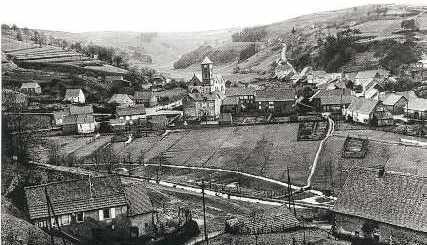
Lambach is rich in medieval history and architecture, including the unique triangular-shaped Paura Church. The Hitlers' initial location at the intersection of Linzerstrasse and Kirchengasse12 overlooks the Lambach Abbey, a great Benedictine monastery founded in the eleventh century and adorned, curiously enough, by a half a dozen swastikas amidst the Byzantine frescoes.
The explanation for the presence of the swastikas lies in the delight in puns of a former abbot, Theodorich von Hagen. The German word for swastika is Hakenkreuz. Hagen -- Haken. It is as simple as that.13
Enrolled in the monastery's choir--under choir director Padre Bernhard Groener--and school, Adolf continues to do well, achieving the Austrian equivalent of straight A's. Frau Helene Hafstaengl, the wife of a future crony, will testify that Adolf once told her that "as a small boy it was his most ardent wish to become a priest. He often borrowed the large kitchen apron of the maid, draped it about his shoulders in vestment fashion, climbed on a kitchen chair and delivered long and fervent sermons."14 Hitler himself will later recall:
Since, in my free time, I received singing lessons in the cloister at Lambach, I had excellent opportunity to intoxicate myself with the solemn splendor of the brilliant church festivals. It seemed to me perfectly natural to regard the abbot as the highest and most desirable ideal, just as my father regarded the village priest as his ideal.
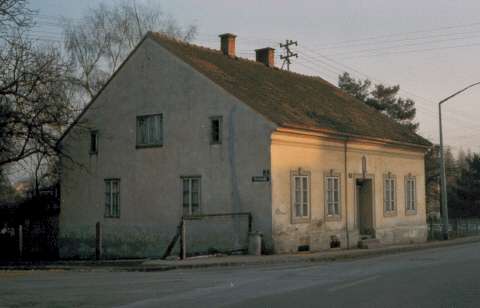
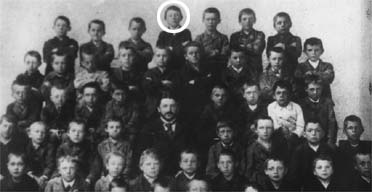
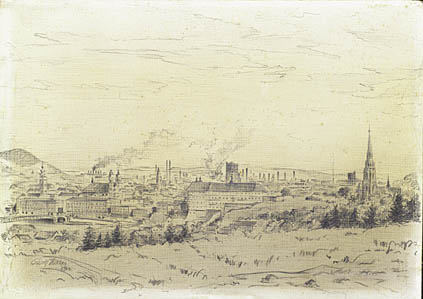
Adolfs attitude becomes sullen and he begins to receive less than exemplary marks in school, including an "erratic" in diligence with failing marks in natural history and math. He will have to repeat this first class altogether the following year.
The move from Gymnasium--which taught a more classical education, with such subjects as Latin--to the Realschule, with its more technical curriculum, is often thought curious because it was not a traditional path to the civil service, which is the path old Alois desired Adolf to take. However, Alois himself did not take the traditional path either, making the choice perhaps somewhat less curious.
Adolf’s fellow classmate, Josef Keplinger: "He (Hitler) had 'guts.' He wasn't a hothead but really more amenable than a good many. He exhibited two extremes of character which are not often seen in unison, he was a quiet fanatic."
One of Adolf's teachers at Linz Realschule, a Professor Theodor Gissinger, would say: "I remember that he used to hold conversations with the wind-blown trees."
The recent death of his brother Edmund, to whom he was attached, may be a factor in the boy's academic decline. Even more pertinent, perhaps, is the fact that the Realschule is a new experience for Adolf, much larger than any school he had ever attended, and therefore with much more competition. Dimensions reverse unfavorably for him, as he is no longer a big fish in a small pond. Then there is the growing struggle with old Alois. The concentration of parental energies on Adolf's education is having (typically) the opposite effect from that intended: The boy rebels.19
But now, to be sure, there was a new conflict to be fought out. As long as my father's intention of making me a civil servant encountered only my theoretical distaste for the profession, the conflict was bearable. Thus far, I had to some extent been able to keep my private opinions to myself; I did not always have to contradict him immediately. My own firm determination never to become a civil servant sufficed to give me complete inner peace. And this decision in me was immutable.
The problem became more difficult when I developed a plan of my own in opposition to my father's. And this occurred at the early age of twelve. How it happened, I myself do not know, but one day it became clear to me that I would become a painter, an artist. There was no doubt as to my talent for drawing; it had been one of my father's reasons for sending me to the Realschule, but never in all the world would it have occurred to him to give me professional training in this direction. On the contrary. When for the first time, after once again rejecting my father's favorite notion, I was asked what I myself wanted to be, and I rather abruptly blurted out the decision I had meanwhile made, my father for the moment was struck speechless. "Painter ... Artist?"
He doubted my sanity, or perhaps he thought he had misheard or misunderstood me. But when he was clear on the subject, and particularly after he felt the seriousness of my intention, he opposed it with all the determination of his nature. His decision was extremely simple, for any consideration of what abilities I might really have was simply out of the question. "Artist, no, never as long as I live!" But since his son, among various other qualities, had apparently inherited his father's stubbornness, the same answer came back at him. Except, of course, that it was in the opposite sense. And thus the situation remained on both sides. My father did not depart from his "Never!" And I intensified my "Oh, yes!" The consequences, indeed, were none too pleasant.
The old man grew embittered, and, much as I loved him, so did I. My father forbade me to nourish the slightest hope of ever being allowed to study art. I went one step further and declared that if that was the case I would stop studying altogether. As a result of such "pronouncements" of course, I drew the short end; the old man began the relentless enforcement of his authority. In the future, therefore, I was silent, but transformed my threat into reality. I thought that once my father saw how little progress I was making at the Realschule, he would let me devote myself to my dream, whether he liked it or not. I do not know whether this calculation was correct. For the moment only one thing was certain: my obvious lack of success at school.
Some Hitler biographers have gone out of their way to cast doubt upon this assertion by Hitler, propagating a contrary explanation: that the poor marks themselves initiate the struggle, with Hitler blaming his embarrassing decline in performance upon a cynical conscious calculation. Either way, relations between father and son remain less than idyllic at this point in time. According to Ian Kershaw:Hitler, from Mein Kampf:
Whether the young Adolf, allegedly at the age of twelve, so plainly stipulated he wanted to be an artist may be doubted. But that there was a conflict with his father arising from his unwillingness to follow a career in the civil service, and that his father found fault with his son's indolent and purposeless existence, in which drawing seemed to be his main interest, seems certain.20
Rummaging through my father's library, I had come across various books of a military nature, among them a popular edition of the Franco-German War of 1870-7I. It consisted of two issues of an illustrated periodical from those years, which now became my favorite reading matter. It was not long before the great heroic struggle had become my greatest inner experience. From then on I became more and more enthusiastic about everything that was in any way connected with war or, for that matter, with soldiering.
Josef Keplinger, one of Adolfs classmates: "Bismarck was for us a national hero. The Bismarck song and lots more German hymns and songs of the same character, were forbidden to be sung." Note: The Austrian and German anthems were sung to the same music by Haydn. The Pan-Germans would rebelliously sing the lyrics of 'Deutschland ueber Alles'; they would also greet each other in secret with the German 'Heil!'21

I never had any particularly artistic interests. I could draw rather well and learned easily. My brother was very good in some subjects and very weak in others. He was the weakest in mathematics and, as far as I can remember, in physics, also his failure in mathematics worried my mother. He loved music. He preferred Wagner even then. Wagner was always his favorite.22
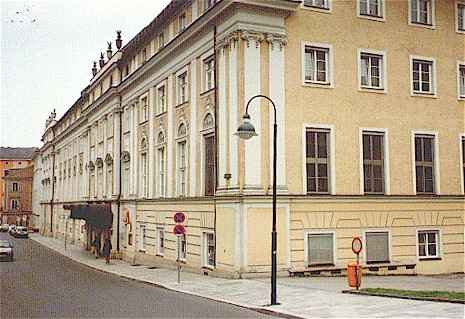
The provincial capital of Upper Austria had at that time a theater which was, relatively speaking, not bad. Pretty much of everything was produced. At the age of twelve I saw [presumably the play] Wilhelm Tell for the first time, and a few months later my first opera, Lohengrin. I was captivated at once. My youthful enthusiasm for the master of Bayreuth knew no bounds. Again and again I was drawn to his works, and it still seems to me especially fortunate that the modest provincial performance left me open to an intensified experience later on. All this, particularly after I had outgrown my adolescence (which in my case was an especially painful process), reinforced my profound distaste for the profession which my father had chosen for me. My conviction grew stronger and stronger that I would never be happy as a civil servant. The fact that by this time my gift for drawing had been recognized at the Realschule made my determination all the firmer.
December 1901: The "always so robust" Alois Hitler is uncharacteristically bedridden with flu-like symptoms for nearly three weeks; but by spring, appears to have made a full recovery.23When I was thirteen my father died suddenly. The old gentleman, who was always so robust and healthy, suffered an apoplectic stroke, and thus painlessly ended his wanderings on earth, plunging us all into the depths of despair. His most ardent desire had been to help his son forge his career, thus preserving him from his own bitter experience. In this, to all appearances, he had not succeeded. But, though unwittingly, he had sown the seed for a future which at that time neither he nor I would have comprehended.
January 5, 1903: Alois Hitler's obituary, written by "one of Alois Hitler's Leonding acquaintances,"26 is published in the Linz Tagepost:We have buried a good man: this we can rightly say about Alois Hitler, Higher Official of the Imperial Customs, retired, who was carried to his final resting place today. On the third of this month his life came to a sudden end as a result of an apoplectic stroke in the Gasthaus Stiefler, where he had gone because he was feeling unwell, hoping to revive himself with a glass of wine.
Alois Hitler was in his 65th year, and had experienced a full measure of joy and sorrow. Having only an elementary school education, he had first learned the trade of a cobbler, but later taught himself the knowledge needed for a civil service career, which he served with distinction, and in addition he achieved success in husbandry. Salzburg, Braunau, Simbach, Linz, were among the places where he saw service.
Alois Hitler was a progressively minded man through and through and, as such, he was a warm friend of free education. In company he was always cheerful, not to say boisterous. The harsh words that sometimes fell from his lips could not belie the warm heart that beat under the rough exterior. He was always an energetic champion of law and order. Well-informed on all kinds of matters, he could always be counted on to pronounce authoritatively on any subject. Fond of singing, he was never happier than when in a joyful company of fellow enthusiasts. In the sphere of bee-keeping he was an authority.
Not the least of his characteristics was his great frugality and sense of economy and thrift. All in all Hitler's passing has left a great gap, not only in his family: he leaves a widow and four children not well provided for; but also in the circle of his friends and acquaintances who will preserve pleasant memories of him.
In accordance with Alois's status as a very well respected pillar of the community (Honoratioren), nearly the entire village, relatives from Spital, and former colleagues from the custom service attend Alois's funeral. Alois's best friend, primary drinking buddy and fellow customs man Karl Wessely--as well as Josef Mayrhofer, the Mayor of Leonding--are among Alois's pallbearers.27 By the terms of Alois's will, Mayor Mayrhofer is made the guardian of the minor Hitler children.28 Adolf assumes the role of the family's eldest male.
Subsequent scholarship has determined that the "not well provided for" line in the obituary is not factual. Alois's pension and assets are substantial, and the family's lifestyle barely alters.29 In fact, Adolf will now be able to board with five or six other boys in the home of Frau Sekira near the Linz Realschule, thus avoiding the long daily walk. Adolf carries himself with reserve, always using the formal 'Sie' with landlady and peers alike. Frau Sekiras only complaint seems to have been that Adolf, already developing the habit of staying up quite late working on some project or another, would go through an inordinate number of candles. Finding him--in the middle of the night--bent over a map that he was decorating with colored pencils, she asked him: "Why Adolf, what on earth do you suppose you are doing?" "Studying maps," he curtly replied.30
Even though Klara does her best to motivate the boy, trying as well as she can to enforce Alois's posthumous wishes for Adolf's education, he continues to post failing marks.
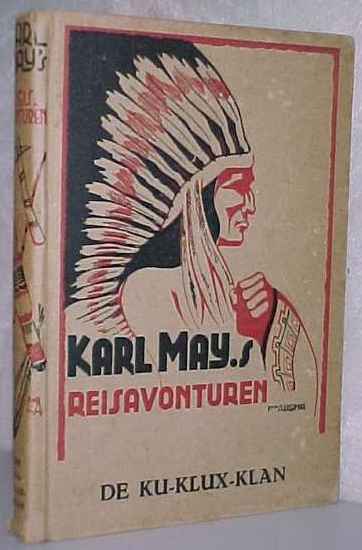
I well remember the gaunt, pale-faced boy who shuttled backwards and forwards between Linz and Leonding. Hitler was certainly gifted, although only for particular subjects. He lacked self-control and, to say the least, he was considered argumentative, autocratic, self-opinionated and bad-tempered, and unable to submit to school discipline. Nor was he industrious; otherwise he would have achieved much better results, gifted as he was. He reacted with ill-concealed hostility whenever a teacher reproved him or gave him some advice. At the same time, he demanded the unqualified subservience of his fellow-pupils, fancying himself in the role of a leader, and of course playing many small harmless pranks, which is not unusual among immature youngsters. He seemed to be infected with the stories of Karl May and the Redskins.
Hitler finds in Karl May a favorite author who will entertain and inspire him till his dying day; a full collection of May's novels will be found in the Fuehrer Bunker. So important is Hitler's discovery of May that forty years later he will remember with clarity the day that fellow schoolmate Fritz Seidl, upon encountering young Hitler reading The Last of the Mohicans declares, "Fennimore Cooper is nothing, you must read Karl May." Hitler:
I owe to Karl May my first ideas about geography, and the fact that he opened my eyes to the world.
An ex-convict and avowed pacifist from Saxony, May authored numerous popular adventure stories set in the American Wild West, while never personally setting foot outside the continent of Europe. May's books are all the rage in these times, and Hitler and his peers follow, with devotion, the gratuitous butchery perpetrated by the white American hero, Old Shatterhand, as he decimates the ranks of the evil Ogellallah Indians with clever brutality.
On occasion during his war, Hitler, the perpetual adolescent, will sometimes refer to the Russians as Redskins, and even present some of his less-motivated generals with copies of certain May works to provide them inspiration.32 (One imagines Churchill giving a Hardy Boys volume to Chamberlain.)

Of my other brothers and sisters I especially remember my stepsister Angela as a beautiful girl. Also she was watched by my father very harshly. He was examining every wooer with the strict demand that only a civil servant was allowed to marry her. Really in 1903 she married the Revenue officer Leo Raubal in Linz, who died very young in 1910. After his death my sister with her 3 children went on to live in Linz for a short time. Then she removed to Vienna. Later on she married the university professor Hammitzsch in Dresden. They had no children.

The later German Fuehrer's childhood anecdotes, in the marginally reliable "Hitler's Table Talk," as with much of Hitler's written and spoken words, are to be taken with many selective grains of salt.37 With this in mind, the following paraphrased excerpts are presented:
Father Franz Sales Schwartz, Adolf's religion teacher at Linz Realschule, is described as short, fat, ugly, and no match for the wit and wisdom of the precocious youth. When Schwartz asks him if he takes care to pray at least three times a day, he has himself replying, "No sir, I never say my prayers. Why should God be interested in the prayers of a schoolboy?"
While Klara Hitler is at the school conferring with Father Schwartz about Adolf's poor marks, the priest turns to him and says, "You poor, unhappy boy." "I'm not unhappy at all," Adolf declares. "Yes you are," insists Schwarz, "and you'll realize how unhappy you are when you enter the next world." Hitler responds, "I have heard about scientists who doubt whether there is a next world." The startled priest now makes a strategic error and addresses the lad with the familiar 'Du,' "What do you mean?" Taking full advantage of this breach of etiquette, Adolf answers in tones of outrage and formal dignity, "I must inform you, sir, that you are addressing me with the familiar 'Du.'" Schwartz: "Well, you won't go to heaven." The adult dictator will still take satisfaction nearly forty years later from his rhetorical argument-ending triumph, "Not even if I buy an indulgence?"
Hitler: A bright youngster of thirteen or fourteen can always get the better of a professor dulled by the grind of years of teaching.
Hitler: Our teachers were absolute tyrants. They had no sympathy with youth; their one object was to stuff our brains and turn us into erudite apes like themselves. If any pupil showed the slightest trace of originality, they persecuted him relentlessly, and the only model pupils whom I ever got to know have all been failures in after-life.
To "learn" history means to seek and find the forces which are the causes leading to those effects which we subsequently perceive as historical events. The art of reading as of learning is this: to retain the essential and to forget the non-essential. Perhaps it affected my whole later life that good fortune sent me a history teacher who was one of the few to observe this principle in teaching and examining. Dr. Leopold Potsch,38 my professor at the Realschule in Linz, embodied this requirement to an ideal degree. This old gentleman's manner was as kind as it was determined, his dazzling eloquence not only held us spellbound but actually carried us away.
Even today I think back with gentle emotion on this gray-haired man who, by the fire of his narratives, sometimes made us forget the present; who, as if by enchantment, carried us into past times and, out of the millennial veils of mist, molded dry historical memories into living reality. On such occasions we sat there, often aflame with enthusiasm, and sometimes even moved to tears. What made our good fortune all the greater was that this teacher knew how to illuminate the past by examples from the present, and how from the past to draw inferences for the present. As a result he had more understanding than anyone else for all the daily problems which then held us breathless.
He used our budding nationalistic fanaticism as a means of educating us, frequently appealing to our sense of national honor. By this alone he was able to discipline us little ruffians more easily than would have been possible by any other means. This teacher made history my favorite subject. And indeed, though he had no such intention, it was then that I became a little revolutionary.
Hitler's Report Card from Linz Realschule.39
(Graded 1 for "excellent" to 5 for "inadequate")
1901-02 1902-03 1903-04
Religion 2 2 2
German 4 4 4
French 5 5 5
Geography 3 2 2
History x x 3
Mathematics 3 3 3
Nat. History 2 2 x
Physics x x 3
Geometrical Drawing 1 2 2
Freehand Drawing 4 4 4
Handwriting 1 1 x
Gymnastics 2 2 2
School authorities are decidedly unhappy with Adolf's grade-point average, which is well below the 2 average needed to pass. A deal is worked out whereby, after retaking his French examination, Hitler is allowed to go on to the next grade, provided that he does so at some other school. It is decided to send him to Steyr, a small industrial town 25 miles east of Linz.40
September 1904: Adolf Hitler begins at the Steyr Realschule. As it is too far to commute, he boards with thirty-one year old Petronella Cichini and her elderly husband, and another Realschule pupil.41
Summer 1905: The Hitler family, as usual, passes the summer months in Spital with Klara's relatives, including Aunt Theresa and Uncle Anton Schmidt, Klara's mother, Johanna Poelzl, and a large collection of cousins.42 This summer, the usually active boy comes down with a respiratory ailment that curtails his activities. Dr. Karl Keiss travels to Spital from nearby Weitra to examine him, and renders a diagnosis of consumption. By playing on Klara's sympathies, Adolf will utilize this timely illness in his soon-to-be-successful campaign to burn his pencils and books.
It has been noted that Alois had the very same "lung ailment," yet lived to the age of 66. Dr. Keiss, for one, was convinced that Adolf's "disease" was serious: "Adolf will never be healthy after this sickness," he told Adolf's Aunt Theresia. John Toland will write:Detractors later charged that Hitler had lied about his ill-health in Mein Kampf, but Paula testified that her brother did suffer a hemorrhage; a boyhood friend remembered that "he was plagued by coughs and nasty catarrhs, especially on damp, foggy days,' and a neighbor testified that he was "in poor health and had to leave his studies because of a lung problem--as a result of which he was spitting blood."43
June 15, 1905: Klara Hitler sells the garden house at Leonding for a handsome profit--the sale price is 10,000 kronen, which is a net profit of 2,300 kronen over Alois' purchase price--and moves the clan to Linz proper.44 The respectable third floor apartment on 31 Humboldtstrasse is "recently built" and has "pretensions to elegance." The apartment--dominated by a large portrait of the deceased Alois and filled with green-painted furniture--has beds for Klara and Paula in the living room, with Adolf in his own small bedroom next to it.45
Autumn 1905: Adolf Hitler meets August Kubizek at the Linz Opera House, and they soon become best friends.46
August Kubizek, from his memoirs:He was a remarkably pale, skinny youth, about my own age, who was following the performance with glistening eyes. I surmised that he came from a better-class home, for he was always dressed with meticulous care and was very reserved. We took note of each other without exchanging a word. During the interval of a performance some time later we started talking, as apparently neither of us approved of the casting of one of the parts. We discussed it together and rejoiced in our common adverse criticism. I marveled at the quick, sure grasp of the other. In this he was undoubtedly my superior. ...
September 16, 1905: After passing his geometry re-sit, sixteen-year-old Adolf Hitler leaves Steyr Realschule, ending his formal schooling.47
This went on for some time; he revealing nothing of his own affairs, nor did I think it necessary to talk about myself. But all the more intensely did we occupy ourselves with whatever performance there happened to be and sensed that we both had the same enthusiasm for the theatre. Once, after the performance, I accompanied him home to No. 31 Humboldtstrasse. When we took leave of each other he gave me his name: Adolf Hitler.
From Mein Kampf:What gave me pleasure I learned, especially everything which, in my opinion, I should later need as a painter. What seemed to me unimportant in this respect or was otherwise unattractive to me, I sabotaged completely. My report cards at this time, depending on the subject and my estimation of it, showed nothing but extremes. Side by side with "laudable" and "excellent," stood "adequate" or even "inadequate." By far my best accomplishments were in geography and even more so in history. These were my favorite subjects, in which I led the class.
Perusal of either Hitler report card presented here reveals that Hitler's recollections are inadequate at best. He does, however, seem to have "led the class" in gymnastics and free-hand drawing at one point (below).
Scorecard: The Hitler household at this point: Klara, Adolf, Paula, and Johanna Poelzl.48
Hitler's Report Card from Steyr Realschule:49
1st Semester 2nd Semester
Moral Conduct 3 satisfactory 3 satisfactory
Diligence 4 unequal 4 adequate
Religion 4 adequate 3 satisfactory
German 5 inadequate 4 adequate
Geography-History 4 adequate 3 satisfactory
Mathematics 5 inadequate 3 satisfactory
Chemistry 4 adequate 4 adequate
Physics 3 satisfactory 4 adequate
Geometry, geo drawing 4 adequate 4 adequate
Freehand Drawing 2 laudable 1 excellent
Gymnastics 1 excellent 1 excellent
Stenography 5 inadequate x
Singing x 3 satisfactory
Handwriting 5 displeasing 5 displeasing
Above: A portrait of Hitler at age 16, drawn by classmate Sturmlechner as he looked at Steyr Realschule.50
From Mein Kampf:My mother, to be sure, felt obliged to continue my education in accordance with my father's wish; in other words, to have me study for the civil servant's career. I, for my part, was more than ever determined absolutely not to undertake this career. In proportion as my schooling departed from my ideal in subject matter and curriculum, I became more indifferent at heart.
End of Part Two.
Then suddenly an illness came to my help and in a few weeks decided my future and the eternal domestic quarrel. As a result of my serious lung ailment, a physician advised my mother in most urgent terms never to send me into an office. My attendance at the Realschule had furthermore to be interrupted for at least a year. The goal for which I had so long silently yearned, for which I had always fought, had through this event suddenly become reality almost of its own accord. Concerned over my illness, my mother finally consented to take me out of the Realschule and let me attend the Academy (Note: The Academy of Fine Arts in Vienna).


Written by Walther Johann von Löpp Copyright © 2011-2013 All Rights Reserved Edited by Levi Bookin — Copy Editor European History and Jewish Studies






Disclaimer:The Propagander!™ includes diverse and controversial materials--such as excerpts from the writings of racists and anti-Semites--so that its readers can learn the nature and extent of hate and anti-Semitic discourse. It is our sincere belief that only the informed citizen can prevail over the ignorance of Racialist "thought." Far from approving these writings, The Propagander!™ condemns racism in all of its forms and manifestations.
Fair Use Notice: This site--The Propagander!™--may contain copyrighted material the use of which has not always been specifically authorized by the copyright owner. We are making such material available in our efforts to advance understanding of historical, political, human rights, economic, democracy, scientific, environmental, and social justice issues, etc. We believe this constitutes a "fair use" of any such copyrighted material as provided for in section 107 of the US Copyright Law. In accordance with Title 17 U.S.C. Section 107, the material on this site is distributed without profit to those who have expressed a prior interest in receiving the included information for research and educational purposes. If you wish to use copyrighted material from this site for purposes of your own that go beyond 'fair use', you must obtain permission from the copyright owner.